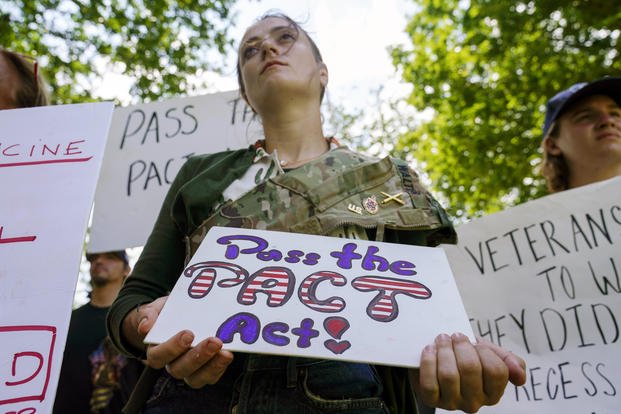A House GOP proposal to retool the Toxic Exposures Fund -- a pot of money created by the PACT Act to pay health care and disability benefits to troops exposed to toxic substances -- drew fierce pushback Thursday from the Department of Veterans Affairs and Democrats.
Republicans maintain their proposed legislation aims to fix a problem that few dispute: Toxic Exposures Fund rules are projected to increase mandatory federal spending on other veterans bills unrelated to toxic exposure, which in turn could make it harder for Congress to pass legislation that affects veterans.
But Democrats are accusing Republicans of trying to undermine the PACT Act's guarantee of health care and benefits for veterans exposed to toxins during their military service, and VA officials testified during a hearing Thursday on Capitol Hill that they oppose the GOP's proposal, called the Toxic Exposure Fund Improvement Act.
Read Next: Fired Navy SEAL Captain Was Arrested for Drunk Driving Months Before His Relief
"Given the great success of the PACT Act and the Toxic Exposures Fund, we are concerned about certain provisions contained in the Toxic Exposure Fund Improvement Act and potential unintended consequences that may adversely affect veterans," said VA Chief Financial Officer Jon Rychalski.
Rychalski's written hearing testimony added that "VA's ability to provide benefits and services for toxic-exposed veterans would be significantly jeopardized" by parts of the bill.
Formally called the Cost of War Toxic Exposures Fund, or the TEF as it has come to be known, the fund has been a flash point since Congress was first debating the PACT Act.
The fund was created to pay for the expanded benefits and care granted by the PACT Act. It was designated as mandatory spending, which supporters argued would shield it from the whims of Congress' annual funding debates. In general, mandatory spending is funding that is provided independent of the yearly appropriations process, while discretionary spending is subject to annual approval from Congress.
During the 2022 consideration of the PACT Act, some Republicans argued the TEF would become a slush fund so the VA and other parts of the federal government could skirt budget constraints. The fund was at the center of why some Senate Republicans blocked the PACT Act's passage before veterans staged a 24/7 protest on the steps of the Capitol.
For this fiscal year, the fund was allocated $20 billion, and it is on track to get $24 billion in the next fiscal year.
Since the passage of the PACT Act, the Congressional Budget Office has projected that several veterans bills unrelated to toxic exposure could increase mandatory spending because they could potentially be paid for with the TEF. In general, congressional rules require any increase in mandatory spending to be offset either with spending cuts elsewhere or increased revenue, making it difficult to pass the veterans bills getting a bad CBO score.
To address that, the bill debated Thursday by the House Veterans Affairs Committee would narrow the circumstances in which TEF funding could be used; redesignate funding to discretionary spending; place caps on the fund through fiscal 2033; and require the VA to submit a plan to Congress for funding amounts from 2034 to 2045.
"This bill would absolutely not abolish, cut or undermine the Toxic Exposures Fund," House Veterans Affairs Committee Chairman Mike Bost, R-Ill., said at the hearing. "It would finally solve the wonky, inside-the-Beltway problem that has stopped a lot of good, bipartisan legislation from moving through this committee."
But Democrats charged that Republicans are really aiming to kneecap the PACT Act.
"We agreed that we would not pit toxic-exposed veterans against other Americans in need -- whether it be hungry children, seniors, those going to college, Americans who need job training, or even other veterans who use these programs," said Rep. Mark Takano, D-Calif., the ranking member of the committee. "This legislation could have the effect of taking us back to a situation of deciding which veterans' programs would get cut, or whether we would have to deny benefits to some cohort of toxic-exposed veterans."
Takano added that, while he agrees the issue of CBO scores needs to be addressed, he believes that can be done without rewriting the rules of the TEF.
Among the issues that VA officials said they have with Bost's proposal is that the caps would be $17 billion less than VA budget projections are currently estimating the fund will receive in the coming years.
"We'd have to make that up somewhere else," Rychalski said. "We would take it from other programs. It could be infrastructure, it could be equipment, it could be rural health, it could be wherever we need it to. Obviously, we're going to provide the care to veterans, so other things are going to" need to be cut.
The caps could also make it hard to add conditions to the list of illnesses presumed to be caused by military service, Rychalski said. The PACT Act designated certain illnesses as presumed to be linked to military service, but it also created a streamlined process to add more ailments to the VA's presumptive list in the future.
"We are just coming out of years of denial of the effects of toxic exposure to the age of enlightenment," he said. "We have now the statutory authority in the PACT Act or the statutory process to look at presumptives, and we have to have the resources to do that. The current Toxic Exposures Fund provides those resources. The Toxic Exposure Improvement Act does not."
Bost suggested he is open to changes in the bill even as he bristled at Democrats' characterization that it would undermine the PACT Act.
"If anyone has a proposal besides this one to fix the problem, I'm here," he said. "We have handcuffed ourselves on this committee. To try to figure out and be responsible now, we've got to unhandcuff ourselves so that all veterans and family members and survivors can receive the benefits they deserve."












